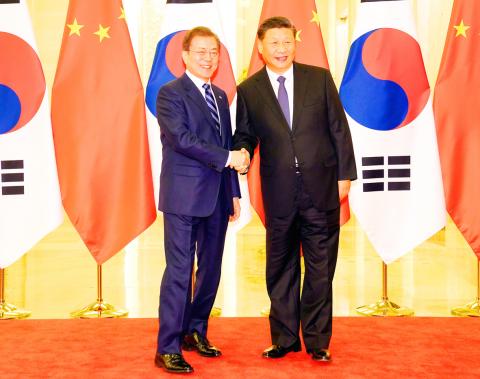The leaders of South Korea and China yesterday said that they look forward to improved ties following a protracted disagreement over the deployment of a US anti-missile system that Beijing considers a threat.
South Korean President Moon Jae-in told Chinese President Xi Jinping (習近平) that while the sides might have felt “disappointed toward each other for a while,” their shared culture and history prevented them from becoming completely estranged.
“It is hoped that South Korea’s dream becomes helpful for China, as China’s dream becomes an opportunity for South Korea,” Moon said in opening remarks before reporters were ushered from the room.

Photo: EPA-EFE
In his opening comments at the meeting at the Great Hall of the People in Beijing, Xi described bilateral ties as “a substantial relationship in the world and an influential relationship among world nations.”
Ties between the neighbors nosedived in 2017 after Seoul accepted the placement of a Terminal High Altitude Area Defense, or THAAD, system in South Korea. Beijing insists its real purpose is to use its powerful radars to peer deep into its territory, rather than to warn of North Korean missile launches and shoot them down.
A furious China launched an unofficial boycott of everything from Chinese tour group visits to South Korea to South Korean television shows, boy bands and other cultural products.
However, it was unable to force South Korea to remove the system and its fury appears to have subsided somewhat amid its trade dispute with the US and tensions elsewhere in Asia.
South Korea now hopes to have Xi visit next year and is also eager to have Beijing use its influence with North Korea to give a jolt to deadlocked denuclearization talks.
While South Korea appreciates the part China has played in that effort, the “current recent situations in which the talks between the United States and North Korea are stalled and tensions on the Korean Peninsula have become heightened are certainly not favorable, not only for South Korea and China, but also for North Korea,” Moon said in his opening comments.
“I hope that we continue to closely cooperate so that the opportunities we have gained with difficulty can come to fruition,” he said.
Separately, Japanese Prime Minister Shinzo Abe met with Xi in Beijing before flying to the southwestern city of Chengdu to join a trilateral meeting today, which Moon is also to attend.
In a press briefing after the Xi-Abe meeting, Masato Otaka — spokesman for the Japanese minister of foreign affairs — said that Abe “urged China to continue its self-restraint” over Hong Kong and expressed “hope for an early resolution of the situation.”
Abe and Xi also discussed North Korea and the denuclearization of the Korean Peninsula, the spokesman said, and Xi “asked for support” for a joint China-Russia draft UN resolution that proposed easing sanctions against the nuclear-armed state.
“Mr Abe reiterated that he is very much concerned about the situation ... [and] mentioned that under the ‘one country, two systems,’ Hong Kong should continue to be free and open and to be able to enjoy its development,” Otaka said.
Additional reporting by AFP

The Ministry of the Interior (MOI) is to tighten rules for candidates running for public office, requiring them to declare that they do not hold a Chinese household registration or passport, and that they possess no other foreign citizenship. The requirement was set out in a draft amendment to the Enforcement Rules of the Public Officials Election and Recall Act (公職人員選舉罷免法 ) released by the ministry on Thursday. Under the proposal, candidates would need to make the declaration when submitting their registration forms, which would be published in the official election bulletin. The move follows the removal of several elected officials who were

The Republic of China (ROC) is celebrating its 114th Double Ten National Day today, featuring military parades and a variety of performances and speeches in front of the Presidential Office in Taipei. The Taiwan Taiko Association opened the celebrations with a 100-drummer performance, including young percussionists. As per tradition, an air force Mirage 2000 fighter jet flew over the Presidential Office as a part of the performance. The Honor Guards of the ROC and its marching band also heralded in a military parade. Students from Taichung's Shin Min High School then followed with a colorful performance using floral imagery to represent Taiwan's alternate name

FOUR DESIGNATED AREAS: Notices were issued for live-fire exercises in waters south and northwest of Penghu, northeast of Keelung and west of Kaohsiung, they said The military is planning three major annual exercises across the army, navy and air force this month, with the navy’s “Hai Chiang” (海強, “Sea Strong”) drills running from today through Thursday, the Ministry of National Defense said yesterday. The Hai Chiang exercise, which is to take place in waters surrounding Taiwan, would feature P-3C Orion maritime patrol aircraft and S-70C anti-submarine helicopters, the ministry said, adding that the drills aim to bolster the nation’s offshore defensive capabilities. China has intensified military and psychological pressure against Taiwan, repeatedly sending warplanes and vessels into areas near the nation’s air defense identification zone and across

COVETED PRIZE: The US president would be a peace prize laureate should he persuade Xi Jinping to abandon military aggression against Taiwan, William Lai said US President Donald Trump should get the Nobel Peace Prize should he be able to convince Chinese President Xi Jinping (習近平) to abandon the use of force against Taiwan, President William Lai (賴清德) told a conservative US radio show and podcast in an interview. The US is Taiwan’s most important international backer, despite the absence of formal ties, but since Trump took office earlier this year he has not announced any new arms sales to the nation. Trump could meet Xi at the APEC summit in South Korea on Oct. 31 and Nov. 1. Lai, speaking on The Clay Travis and Buck Sexton